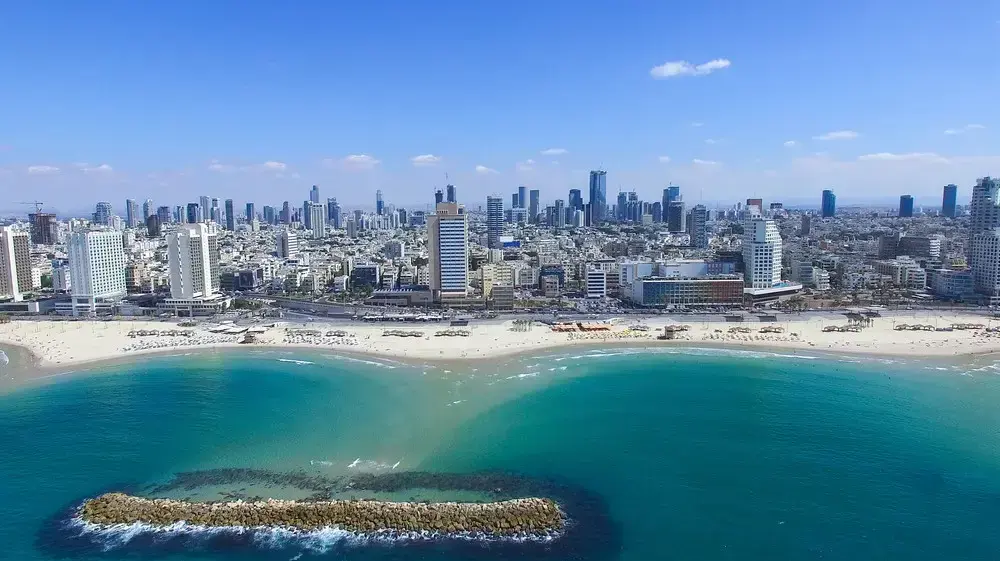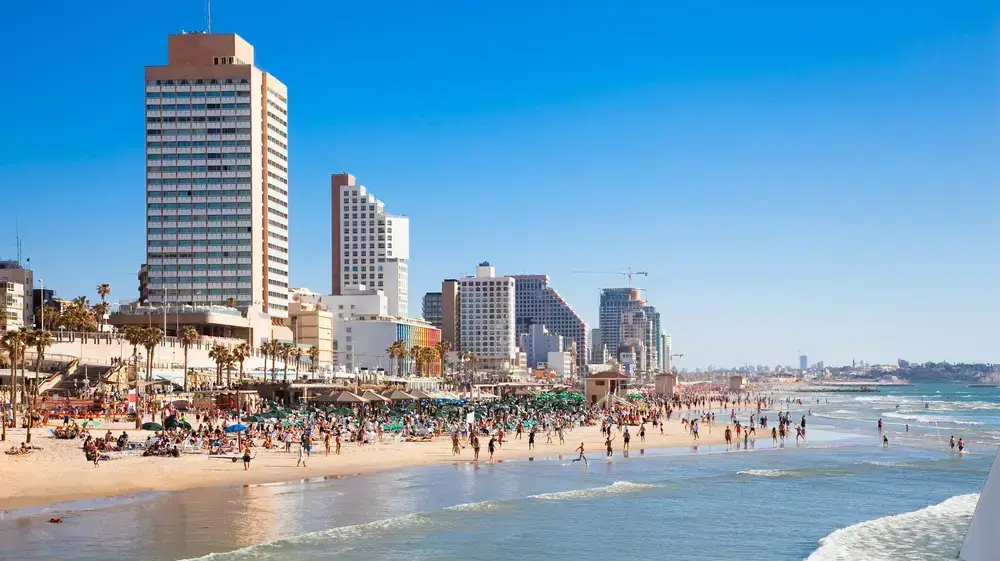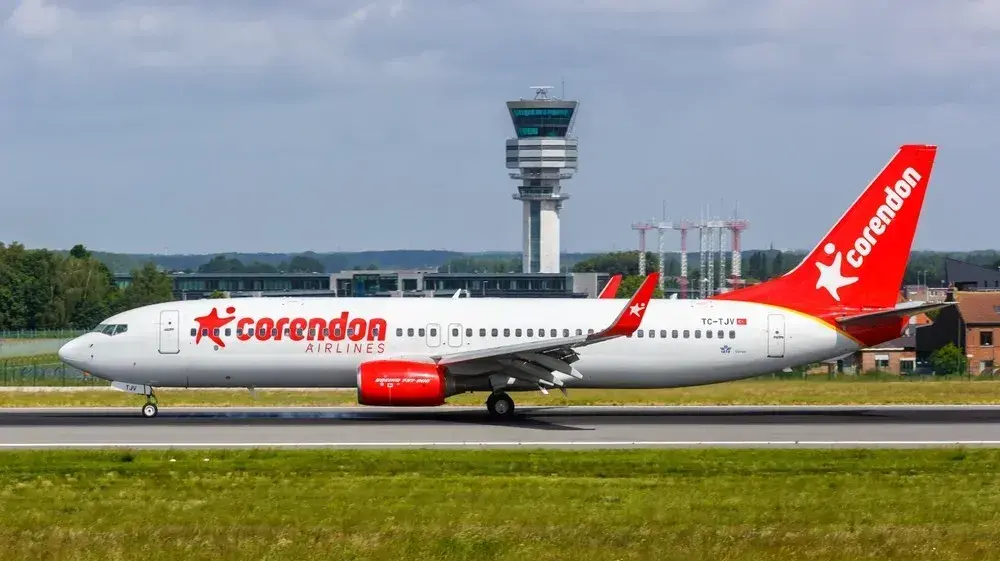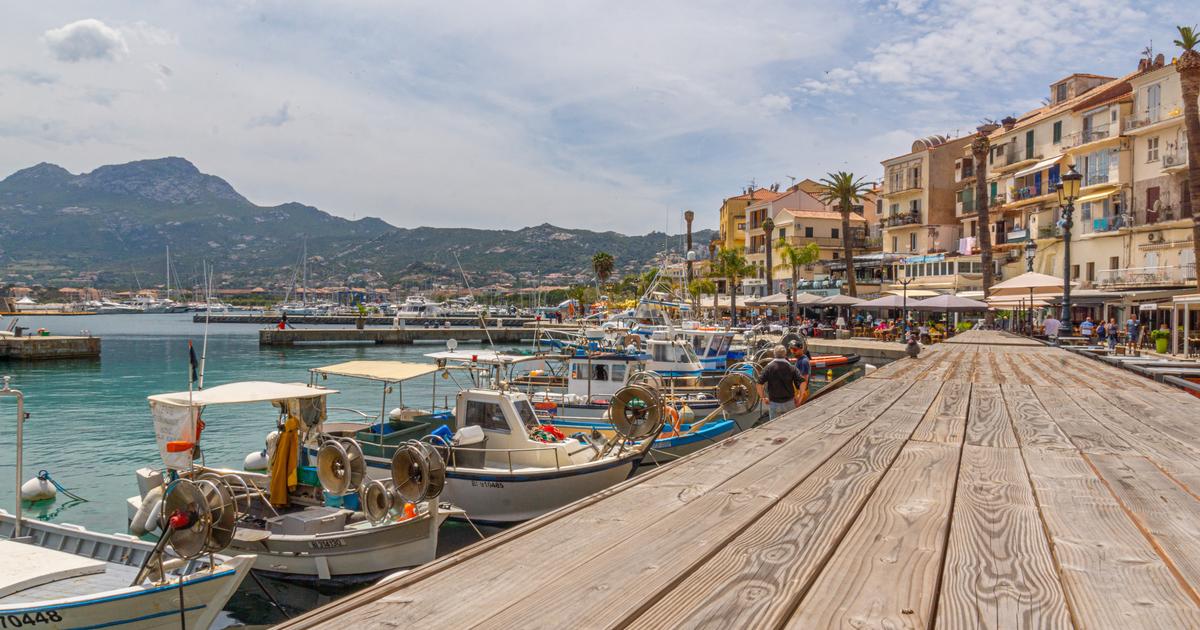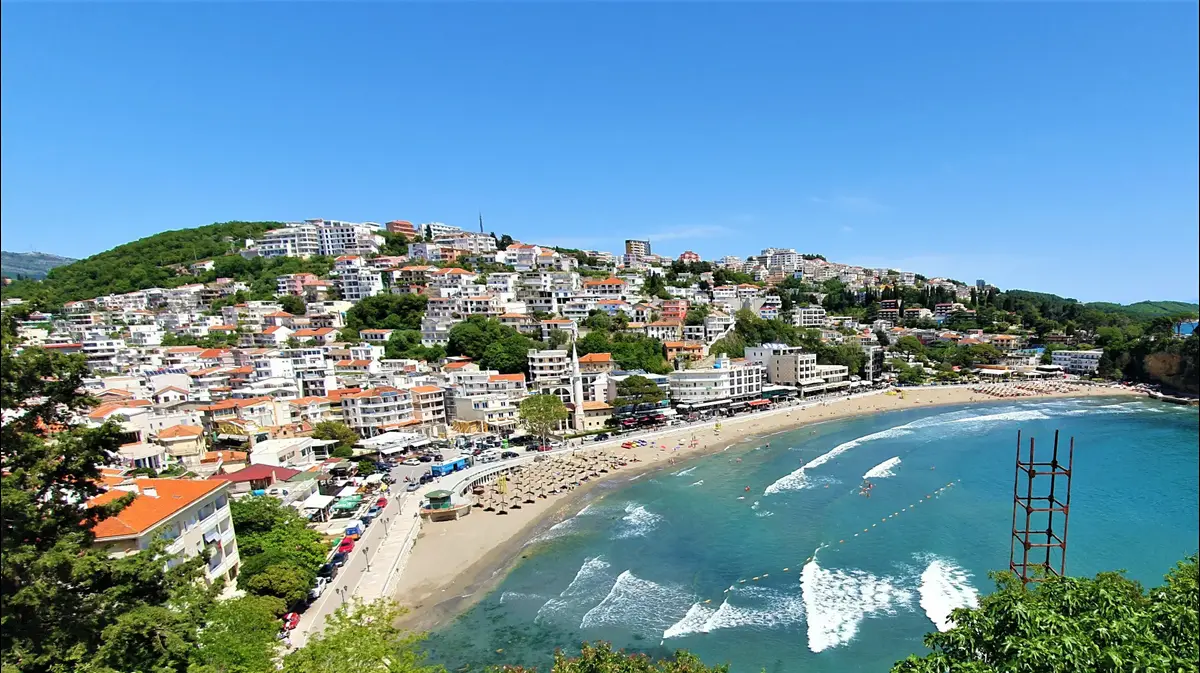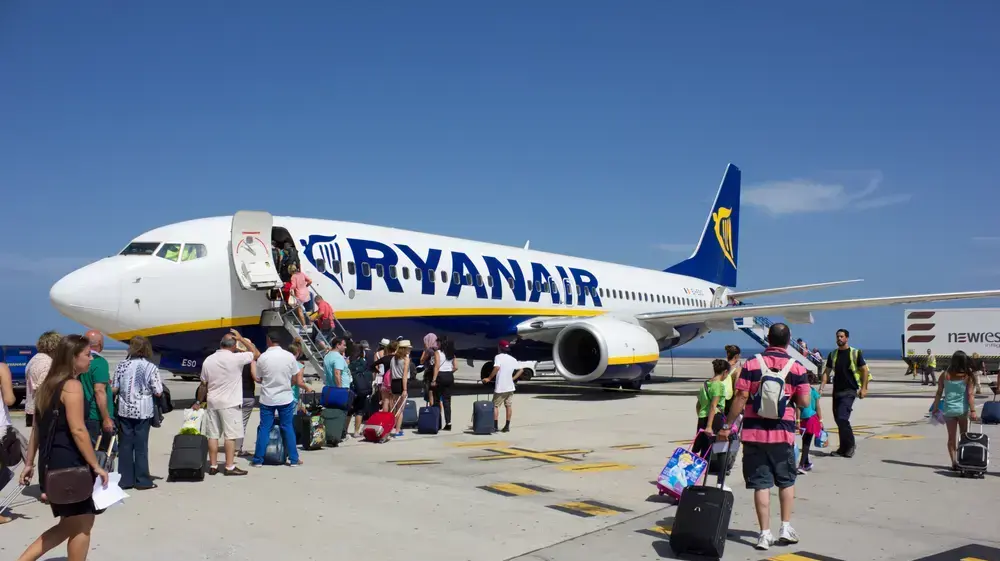Tourism
news
No more Airbnb in Tel Aviv?
This is what will happen to the prices of our vacations
The government housing plan will ban the rental of 12,000 Airbnb apartments in Tel Aviv.
So will hotel accommodation prices go up, now that "there is no competition"?
Possibly, but there are those who cool the enthusiasm and still do not see it happening
Tags
Airbnb
Hotels
Minister of Finance
Tel Aviv Jaffa
Walla!
Tourism
Monday, 01 November 2021, 09:58 Updated: 10:18
Share on Facebook
Share on WhatsApp
Share on general
Share on general
Share on Twitter
Share on Email
0 comments
A mouth full of sea duo teeth
Shark in Nahal Hadera, October 2021
A flight attendant
Sontago Water Park in Poland
Fighting a mouse - Mekorot has started flowing clean water ...
Naked on the pyramid in Egypt
Billion Race: Amazon founder Jeff Bezos took off ...
A huge snake is raised using a crane
Bedouin robbers of antiquities were arrested in a pit hewn in Tel Sheva
Turtles are mated in the Deer Valley
Spike S-512 supersonic passenger plane
Observation at the One Vanderbilt building in New York
Tel Aviv Beach (Photography and Editing: Walla! NEWS)
Are we expecting an increase in hotel accommodation prices due to the ban on renting apartments to tourists on Airbnb in the center of the country? It is very possible.
In recent years, more than 12,000 apartments in Tel Aviv alone have become discounted "tourist properties" or "hotel rooms," giving rise to about 9,000 rooms in the city's hotels. Now, with the new restrictions of the Ministry of Finance under the government housing plan for the years 2025-2022 that will ban the rental of apartments for the purpose of shared hotel platforms, it is possible that hotels in the city will say the price of accommodation.
The Tel Aviv Hotel Association is certainly satisfied with the declaratory move of Finance Minister Lieberman yesterday (Sunday), since its managers have been trying for years to establish regulation and regulation of the issue of renting private apartments to tenants. Today, the issue has erupted and there is no legality or taxation on renting apartments under Airbnb, unlike other leading cities in the world - New York, Berlin, Madrid and others.
"There is no such thing in the whole world. Usually the percentage of apartments allocated to Airbnb is 25 percent of the total number of apartments in the city, and here it is 115 percent," says Walla! Eli Ziv Tourism is a senior member of the Tel Aviv Hotels Association. "All over the world the world has regulations - in Barcelona, Berlin, Los Angeles and New York, only not here." According to Ziv, the main problem with the non-regulation is the removal of apartments from the housing market throughout the country, which also raised the prices of renting apartments in the city by about NIS 900 per month. "In Tel Aviv, extreme phenomena have arisen in neighborhoods where all apartments have become Airbnb, and this is unfair competition towards hotels," he adds.
The housing market in Tel Aviv numbers about 210,000 apartments, of which 90,000 are for rent, of which 20,000 have been rented to businesses.
There are about 70,000 vacant apartments left, of which 12,000 are functional as Airbnb apartments, but not all of them throughout the year (unlike hotels).
"We have a problem of unfair competition," says Ziv.
"That they (the apartment owners) will pay VAT like us.
In other countries they have made a regulation - up to 90 days a year you are allowed to rent, above that you are not allowed to leave the rental market.
There are rules that check this. "He said the tax authorities agreed with Airbnb executives on withholding tax, while in Israel they did not." Tourism Minister Levin did not restrict Airbnb at all, "he adds.
More on Walla!
Is Airbnb really hurting tourism in Israel?
To the full article
Fair competition?
Apartments in front of hotels in Tel Aviv (Photo: ShutterStock)
Airbnb - The preferred type of accommodation in the Corona era
"Ignoring the Airbnb phenomenon, which is a preferred type of accommodation in the Corona era, reflects an excelent thought that does not consider reality"
According to Yossi Fattal, CEO of the Travel Agents Association, the right way to settle the Airbnb issue is to impose the same tax obligations and not ban them altogether. "In Israel as in Israel," he says, "either do nothing or do too much. Ignoring the Airbnb phenomenon, which is a preferred type of accommodation in the Corona era, reflects an excelous thought that does not consider reality. Accommodation in local apartments is a requirement as part of a tourist experience anywhere in the world.
According to him, the manner in which the decision is made ignores the fact that after the end of the Corona crisis, when we return to the tourist numbers of 2019 and even more, this lack will create expensive accommodation prices on an international scale. "The needs of the tourism market have not been taken into account, this disregard is unprofessional and will return like a boomerang when demand returns. The end of an act in thought is commonly said. That is not the case," he adds.
Indeed, the number of tourists who came to Israel in the pre-Corona, which stood at a record 4.5 million tourists, is estimated to take years to return to normal, and hoteliers in the city are reluctant to rub hands with the new ban. "Even in the peak year of tourists in the country in 2019, occupancy in the city stood at 75 percent," says Tel Aviv Hotel Association CEO Oded Grofman, "meaning we did not reach the glass ceiling. The supply of rooms in Tel Aviv with tourism today is great, and the variance between hotels in the 5-3 star level can be a solution. " In February on Hayarkon Street.
Grupman certainly welcomes the decision to ban the rental of Airbnb apartments in the city without regulation, as it is an unfair competition, but still does not see the move happening. "We have worked to get the issue settled, as in the whole world, but it is not clear to us how this will happen and there is no detail of enforcement, what is the definition of an Airbnb property, what will be the taxation on it and the like," he says.
Will the move affect accommodation prices in the city?
Groupman: "I do not think Airbnb has lowered the prices because these are apartments like hotel suites, and the average price of an apartment on this platform is like that of a hotel room in Tel Aviv, so there was actually a business here that operated at a 5-star plus level. Supply and demand, we do not interfere with prices. The number of rooms added to Tel Aviv is estimated at thousands and today there are about 10,000 rooms, and in the coming years several thousand more will be built. Geopolitical in Israel,Corona and other factors. "
"The fact that there was no series on the subject, made investors not build. Hotels in Tel Aviv (Photo: ShutterStock)
The big problem of Tel Aviv hotels
In Tel Aviv, there is a plan to build about 8,000 hotel rooms by 2030. Of course, a larger supply of rooms is good for competition and lowering prices.
But Tel Aviv needs another problem in populating its hotels - the arrival of tourists to Israel - which is currently very faltering and its future is full of fog.
Unlike hotels in the north or south, which cater more to Israeli couples and families throughout the year, urban hotels, such as Tel Aviv and Jerusalem, rely more on inbound tourism, City Break enthusiasts from Europe or pilgrims who come here on the lowcost but get a bomb of luxury hotel accommodation.
"If the state wants to address popular tourism, it needs to allocate land," Grupman says. “In our study, hundreds of Airbnb apartments were priced at $ 500 a night, and it evolved because there was no regulation or taxation and VAT. The series must be, what exactly will it be? do not know. The model we would like requires licensing and setting a quota of days when it is allowed to rent an apartment, so that both the operator and the apartment owner can not offer the property without a license and for a limited number of days a year. Today in the world the major tourism companies, Expedia, Booking, Airbnb and the like are collaborating with the municipalities. There was no legislation on the subject in Israel. "
Today, in the Corona state, there is a 25 percent occupancy rate in hotels in Tel Aviv, and it is estimated by hoteliers that it will take about five years for the number of overnight stays to peak again.
The Tel Aviv Hotels Association is in talks with the municipality, and together they reached a bill on the subject.
"The municipality hoped, like us, for a settlement like in the world," Ziv explains.
But the Tel Aviv municipality is currently sitting on the fence and trying to learn how the restrictions on renting 12,000 apartments in the city will affect tourism to it, and especially its public coffers.
"At this stage we are studying the housing plan and its implications and then we can comment," the Tel Aviv-Yafo municipality said.
More on Walla!
Israel in the face of the Austrian case: this is how we lose tourists
To the full article
Share on Facebook
Share on WhatsApp
Share on general
Share on general
Share on Twitter
Share on Email
0 comments

